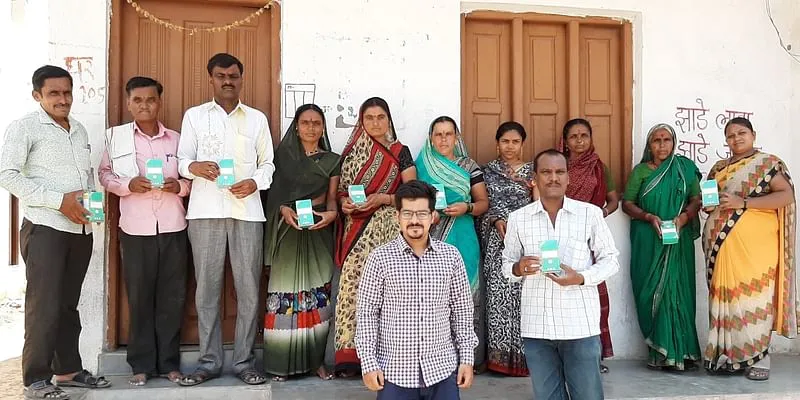This entrepreneur has developed an eco-friendly urine bag for just Rs 15
Founded by Siddhant Tawarawala, Peeschute manufactures eco-friendly unisex disposable urine bags as well as provides a waterless urinal solution.
It is a common sight to see people urinating in public spaces like footpaths in India. The reasons range from lack of access to hygienic public toilets, public apathy, and lack of awareness.
Moreover, the non-availability of clean restrooms is a huge problem for those who travel frequently. Many people, especially women, are forced to hold urine for prolonged periods when outside, which can lead to urinary tract infections.
Siddhant Tawarawala, who used to travel frequently during college days, experienced the issue of non-availability of clean restrooms.

Siddhant Tawarawala
Siddhant decided to find a viable solution to this problem after attending a workshop for entrepreneurs during his third year of engineering. In 2017, he launched , which is developing unisex paper-based disposable urine bags to help people relieve themselves.
“While I always found it difficult to urinate during my travels, I never thought of finding a solution to the problem until I participated in this workshop,” says Siddhant.
Developing the product
To begin with, Siddhant tested different materials that can store liquid. He started experimenting with empty water bottles, paper bags, balloons, and condoms. Around the same time, he applied to Nidhi Prayas, a government scheme specifically meant for student entrepreneurs who have product development plans in the interest of the nation.
Siddhant managed to get an initial funding of Rs 10 lakh from the scheme to develop the product prototype in 2017.
After working for 12-14 months, he launched Peeschute, which aims to solve larger issues like open urination, adequate public urinal facilities, reducing the UTI risks, and improving sanitation standards.

Siddhant distributing Peeschute bags to the villagers
Peeschute's pocketsize paper-based unisex disposal urine bag solidifies human urine immediately to keep it leakproof and odourless.
The disposable urine bag is lined with a special gel that instantly solidifies urine, turning it into an odour-free non-liquid that can be stored and disposed of at one’s convenience. The pouch is shaped like an envelope that can fit into your pocket and can be easily sealed after use.
The urine bags, which are available on its website as well as on Amazon and Flipkart, costs just Rs 15. According to Siddhant, over 2.5 lakh units of Peeschute bags have been sold so far. Besides India, the urine bags have found a market in the US, the UK, Australia, New Zealand and Canada.
Peeschute bags compete with non-eco friendly plastic based bags as well as with brands like PeeSafe, Siyona, and Sanfe.
Peeschute Baksa
Siddhanth says, sometimes people found it difficult to use the bag as they lacked privacy, and were also worried about its disposal.
“I soon realised that just making one product will not work. I want my company to be not just product-based, but a complete solution provider,” Siddhant says.
He took another three to four months and came up with a second solution—a plug-and-play unisex urinal solution named ‘Peeschute Baksa’.
Made of recycled plastic panels, one can urinate directly in the Baksa, which is like a urinal. It is attached with motion sensors to detect if a person is inside the Baksa, and it also automatically switches on the light. The bags that collect urine are also attached with sensors. Once these bags are 85 percent full, an alarm goes off to notify that the bag needs to be changed.

A sample image of Peeschute Baksa
The Baksa has a remote operated lock system and an automatic flush system as well. The user just needs to press a button to use it.
Siddhant says, “We co-ordinate with a distributor, who then appoints retailers or small shopkeepers in places like bus stands, railway stations or public tourist areas where these are installed. People have to pay Rs 5 in these shops to use the Baksa.”
Though not publicly launched, Peeschute Baksa has been tested and piloted in crowded markets, schools, and colleges in 10 locations in Maharashtra.
Claiming to be a first of a kind product, Siddhant says that the installation of Baksa will not cost more than Rs 15,000. “A traditional toilet construction costs around Rs 2.5 lakh, including plumbing and infrastructure. The whole cost saving we do is in solidifying the urine. Baksa will eliminate the need for drainage requirements, plumbing, water, cement, steel, sewage lines, etc., and can be easily installed anywhere. All you need is a 10 sq. ft area,” says Siddhant.
Multiple uses
Siddhant says, the solidified compost can be later used for agricultural purposes in barren lands that lack water and nutrients.
“Urine is rich in urea and moisture, which will be a good fertiliser to the soil,” says Siddhant, adding that this solidified compost is an organic hydrogel discovered by EF Polymer, which is an agri-based Indian startup incubated at Okinawa centre, Japan.
Siddhant met EF Polymer founder Narayan Lal Gurjar at an entrepreneur event in London and decided to collaborate to solve the sanitation woes as well as increase agricultural productivity in India.
“Proper utilisation of the compost will be a challenge once the volume of customers using Baksa increases. The company need to come up with a proper plan by the time it will be used on a large scale,” says Siddhant.
Mission ahead
After launching the product in 2020, Peeschute closed its first angel investment round in June 2020, led by the Hyderabad-based Marwari Angels Group. It recently found an investor on Shark Tank with Aman Gupta, Co-founder and CEO of , who invested Rs 75 lakh in the company.

Siddhant on the SharkTank platform
With a team of 7-10 employees based out of Jalna, Maharashtra, Peeschute is also exploring a pilot opportunity with the Odisha government and with the countries it has a base at.
Apart from that, the company has collaborated with Niti Aayog under Atal Innovation Mission, where it aims to install around 1.5 lakh Peeschute Baksas in the next three to five years across the country.
Further, Siddhant has more plans to cater to the hygiene sector, where he will look to align the products to a circular economy. His team is now working on eco-friendly diapers.
(The story was updated to correct the price of the bag to Rs 15 as the company informed it increased its price.)
Edited by Megha Reddy








